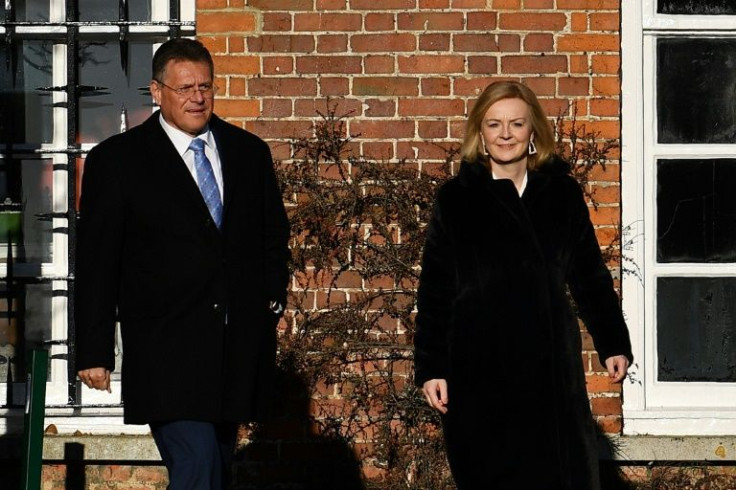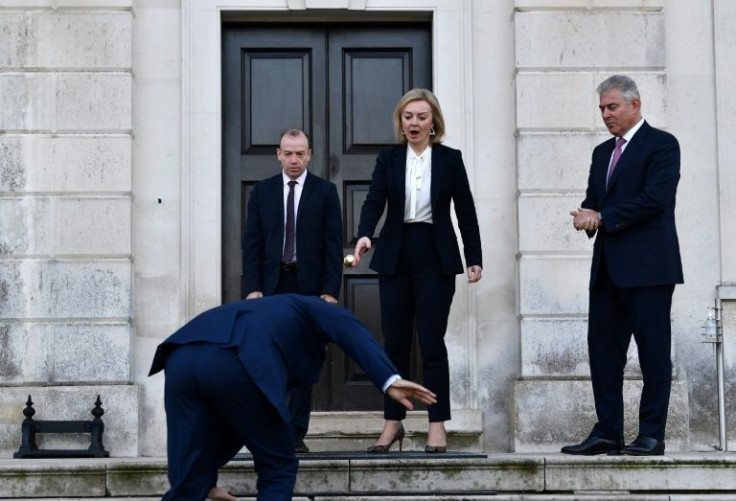UK's Truss Seeks To Break Ice With EU Over N.Ireland Trade
UK Foreign Secretary Liz Truss on Thursday hosted her first face-to-face meeting with European Commission vice president Maros Sefcovic, aiming to thaw frosty relations over post-Brexit trade in Northern Ireland.
Sefcovic slipped on an icy step as he arrived at the government's country residence Chevening, in southeast England, after freezing overnight temperatures.
But he recovered to keep his balance and greet Truss, who took over at the helm of the talks after Brexit minister David Frost's resignation last month.
Inside, the two sides are focusing on Northern Ireland, which has the UK's only land border with the European Union and has been a major stumbling block in the entire Brexit process since the 2016 referendum.
The Northern Ireland Protocol was signed separately from the wider 2020 Brexit trade deal between the UK and the EU and aims to avoid a "hard" border on the island of Ireland.
But to keep the border open -- a key plank of a 1998 peace agreement that ended decades of violence over British rule in Northern Ireland -- the province is effectively still in the European single market.
"Glad to meet my counterpart @trussliz to discuss the implementation of the Protocol on IE/NI," Sefcovic tweeted as discussions started, sharing photos of the pair greeting each other and walking in Chevening's picturesque grounds.

"My objective: stability, predictability in NI," he added, noting they had an opportunity to build on "far-reaching proposals" set out last year by Brussels to ease the on-the-ground tensions.
Checks are required for goods heading east-west from mainland Great Britain (England, Scotland and Wales) to stop unchecked products heading into the single market via Northern Ireland.
But London has indefinitely suspended implementing those checks, and wants the protocol renegotiated, including the removal of European judicial oversight on disputes.
Brussels has rejected the UK call for the European Court of Justice to be replaced with an international arbitration panel.
Truss' predecessor in the negotiations Frost in December cautiously welcomed the Commission's proposal to reform EU medicine supply rules but poured cold water on hopes that an overall agreement to end the row had been found.

A solution needed to be found "urgently early next year", he said, warning that the UK was "ready to use the Article 16 safeguard mechanism" if necessary, referring to the suspension clause in the agreement.
In a recent newspaper article Truss said she was also prepared to trigger that clause, which the EU has warned could lead to a wider trade war.
Last weekend, EU ambassador to the UK Joao Vale de Almeida called her threat "not very helpful".
Ahead of the Chevening talks, Truss appeared to strike a more constructive tone.
"There is a deal to be done that protects peace in Northern Ireland, defends our Union, and maintains the integrity of the United Kingdom and European Union," she said.
"But it will require a pragmatic approach from the EU."
The foreign secretary, who backed the "remain" camp in the EU referendum before switching sides, promised "practical, reasonable solutions with a view to agreeing a plan for intensive negotiations".
However, she put the onus on Brussels to move on the agreement "to help fix the myriad problems caused by the Protocol and protect the Belfast (Good Friday) Agreement".
The United States, which helped broker the Good Friday Agreement, and Irish-American President Joe Biden are watching closely, warning the UK to stick to what it signed.
Washington has warned that London can forget about a trade deal if its actions in Northern Ireland threaten the still-fragile peace.
The protocol has created political tensions in Northern Ireland between pro-British unionists and republicans who want the province to become part of Ireland.
Unionist parties oppose the protocol, warning it threatens Northern Ireland's position as part of the wider UK and makes a united Ireland more likely.
© Copyright AFP 2024. All rights reserved.




















